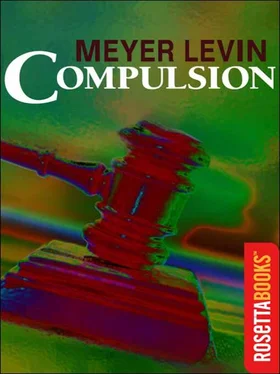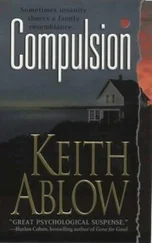With his free hand he tears at his clothing. She seems not so much to be resisting as to have become unliving, frozen. He feels his throbbing power. He will do this. He alone.
“Judd, Judd, I’m afraid for you!” Ruth calls, with awful anxiety, and he seems to hear the call over a distance of years in the voice of his mother as he tries to walk atop a fence. And all at once her arms are around him, holding him close, close, somehow protectively.
In that moment it isn’t predominantly a fear of what might happen to herself that pervades Ruth, but a dreadful anguish for the boy, for the sick, sick eyes, for the tyrannic needs in him – not only his sex lust but something far beyond, some horror. And her intuitive gesture is to draw the sick soul into herself, not the drawing in of sex that might come to a mature woman, but the girlish impulse, the drawing in to her heart.
And then, suddenly, he is spent.
Her head turns sideways, under him, and he rolls from her.
Now if death could come through a wish, he would will himself to cease existing. For it is not only the after-sorrow and the physical disgust of spilling; it is the whole sense of failure, incompetence to live, that invades him.
He lies motionless as she looks at him. He supposes, somehow, he will have to say he is sorry, and he tries to move his lips.
Ruth says, “Don’t. I understand. I want to understand.” And she makes a slight, tentative gesture, as to touch him, but withholds, knowing she must not touch him.
Presently the tension lessens. And then a thought begins to come up in Judd, like some distant memory. One way in which the experience has perhaps succeeded, or meant something. For through the entire attempt, even at the most urgent moment, the moment when it always came, there had not come the image of Artie.
Could he, then, only be like everyone else? Could it be possible that he may come really to be in love with a girl, perhaps this girl? Even marrying, raising a family? Would the whole idea of what that is all about, what ordinary life is all about, come to him, too?
But if he can be ordinary… He shudders in horror and fear, as of losing his very self, and at the same time he experiences a frightful sense of something wasted, the murder as a false and wasted act. If the newer self is the real one, he has in previous dark error forsworn it.
On the way back, they do not refer to the experience. They scarcely speak, and yet Judd does not find himself uncomfortable with her. When he leaves her at her house she asks, “Shall I see you again?”
“Do you want to?” Judd says.
“If you do.”
They make a date for Monday evening.
The crime had become our total obsession. I worked with Tom, running after the police and with the police and ahead of the police from one glimmer to another, and watching the other reporters, and eluding the other reporters, and conjecturing and imagining and listening, and gathering more and more the feeling in the city that some hitherto unknown terror was among us. The child’s fear of wolves prowling in the forest, wolves that will eat you up – this childhood fear seemed now to have leaped awake in every soul in Chicago, and the wolves were the primordial menace, more savage than any beast ever encountered by man. There was a growing presage that something new and terrible and uncontrollable, some new murder-germ, was here involved.
The threat seemed to be against the logic of life itself, for we must have sensed, beyond the touchable aspects of the mystery, that some killing factor, some element, purely murderous, had broken loose. Even before the boys were arrested, there was this dreadful foreknowledge of the escape of some always present, imperfectly contained violence, and if we did not capture it, if we did not hold it and examine it and master its containment, we were all unceasingly exposed, lost.
Tom and I were only a couple of reporters caught up in this hysteria. Yet we could see how, among the police chiefs, there was a growing bewilderment. Their statements daily became more contradictory. Every hour there would be a new crop of sensational clues; by nightfall everything would have been disproven; and on the next day the chiefs would again announce that the murderer would soon be caught.
On Saturday morning, Nolan still declared, in an interview in the Tribune : “There is no doubt in my mind that the man who wrote the suicide letter was the same man who wrote the kidnapping letter.” But by noon the poor suicide had been discounted, forgotten. And a number of other suspects – teachers, even relatives of teachers who owned Underwood portable typewriters – were suddenly being discharged. For though the first expert had stated that the ransom note had been typed on an Underwood, a new expert declared that the machine was a Corona.
The Kessler mail was flooded with tips, and with abuse. Chief of Police Schramm told us that nearly all of his men were working extra shifts, with leaves cancelled, for a veritable epidemic of kidnapping threats had broken out on the South Side, and along the North Shore’s Gold Coast, too. It was always like that after a big crime, he said, but this was the worst.
And actually, three youngsters, sixteen-year-olds, sent messages and made a rendezvous in an elaborate plot to have Kessler bring $25,000 or risk the abduction of his other children. The plotters were caught and arrested. But the imitative fever and the released flood of evil continued unabated. All the quiet-faced people of the city, all the open-faced youngsters – were they all cunning madmen? “You dirty, stingy -! If I had you here I would strangle you to death. We will go a little farther, so watch yourself. You couldn’t keep your dirty mouth closed. To hell with the police. You are crying. You made your money honest. Hah hah. But you will suffer minute by minute you low-down skunk. So low you could walk under a snake. And now every time you disobey us we will strike. Go ahead.” Anonymous.
From these hate letters, police turned again to the revenge theory. But not one out of a thousand of those letters could have come from people who ever had known Charles Kessler. What weird, filthy, primordial imaginings were revealed, carried around behind unidentifiable city faces, walking around in coats and pants of ordinary men, in dresses of ordinary women! The police passed around to us a number of their scrawls, the obscene symbols, the daggers and mystic suns and moons, and the religious quotations and admonitions! Surely so ghastly a punishment, they wrote, was a visitation for some ghastly sin.
Yet each day what was known for sure seemed to be diminishing. Even the suspected teacher, Steger, had not confessed, and doubtlessly the police had used everything on him. Mike Prager came out with a story that Steger had finally admitted to an unnatural liking for young boys. But no one could find out where the teacher was being held. We kept asking Captain Nolan. We kept trying the office of State’s Attorney Horn. Then suddenly, instead of merely shrugging, “I haven’t got him,” Horn changed his reply. “For all I know, he’s home.”
We rushed to the apartment building on Dorchester. Within seconds, a half-dozen cabs with other reporters pulled up. No one answered the bell, no one responded to our knocking. Through the teacher’s door, Mike Prager called offers for an exclusive story. “Name your own price.” We kept calling questions. “Are you going to sue for false arrest? Did you get the third degree?” And finally a tormented, imploring howl came through the closed door. “Let me alone, can’t you!” The questions, the offers increased. But the siege proved futile. After some time, a brother of the teacher arrived with a doctor. “Leave him alone, can’t you! Be human, can’t you!” they pleaded, and managed to slip inside. After more useless badgering, we finally gave up.
Читать дальше












